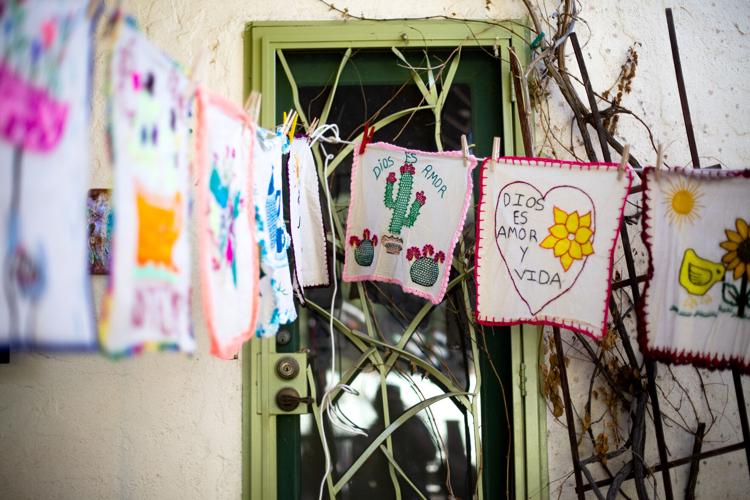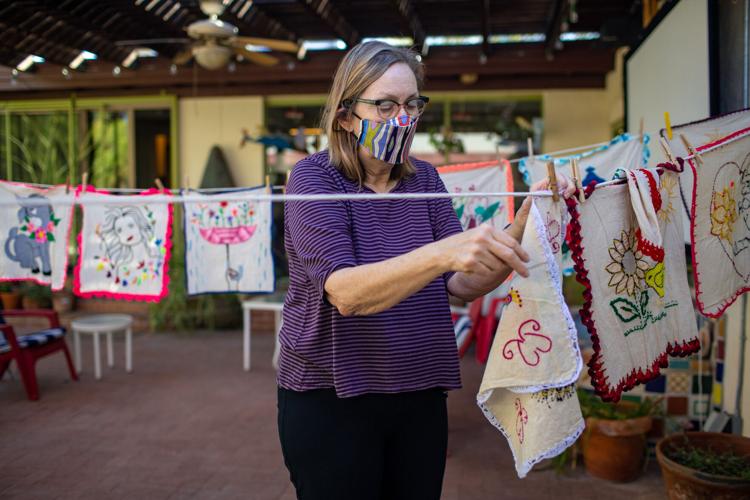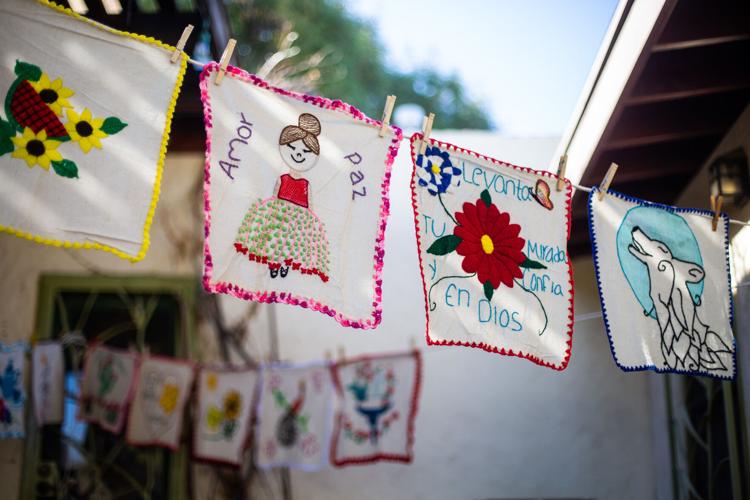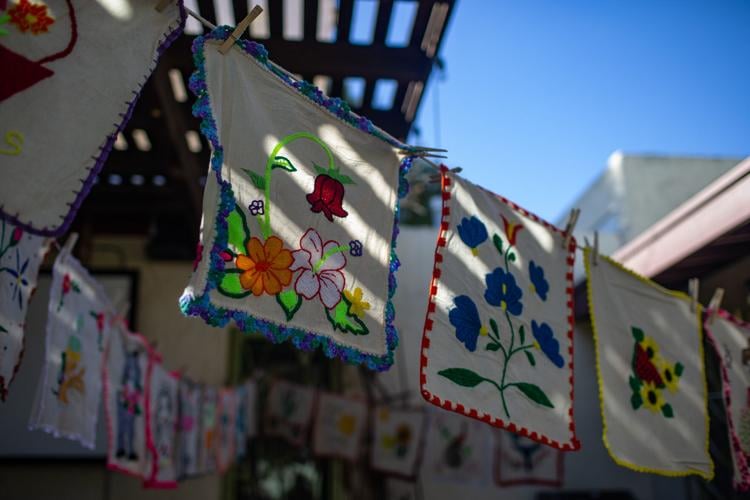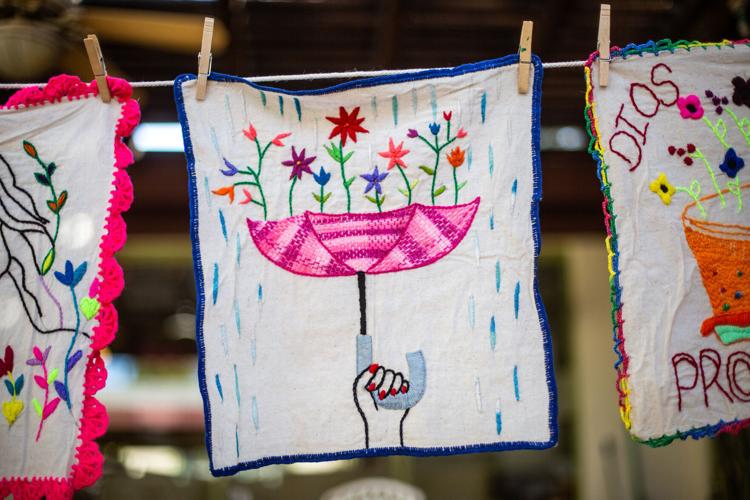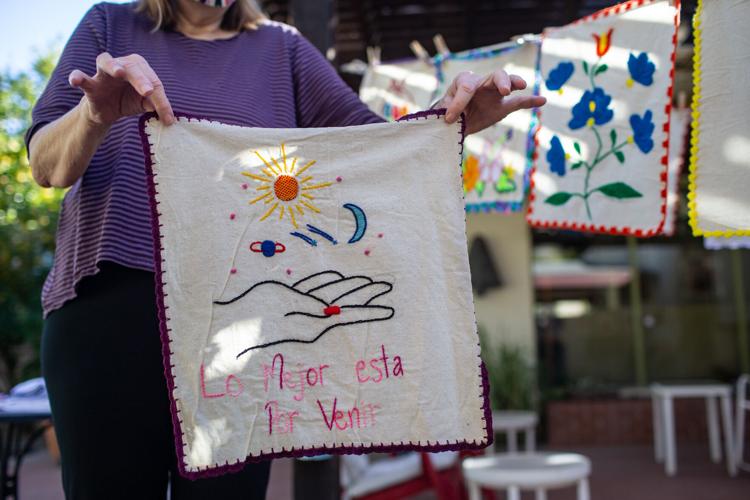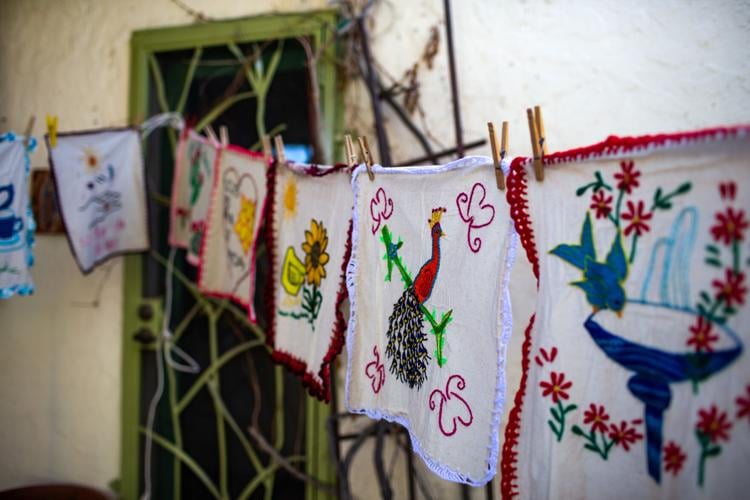For more than a year, Dalianis, an asylum seeker from Cuba, has been stuck at the U.S-Mexico border in Nogales, Sonora waiting in limbo with her 13-year-old son for their asylum case to proceed.
To get there, they crossed five other borders on a journey that has been filled with loss and trauma.
While she waits, Dalianis devotes much of her time stitching floss to fabric creating beautiful embroideries inspired by her faith and the beauty she finds in nature.
"It clears our minds of the negativity we experience in our desperation to cross (the border), and for me it's how I take my mind off things," she says. "It's like it takes me to another world."
Dalianis, who asked that we use a pseudonym to identify her, is one of around 15-30 asylum seekers in Nogales, Sonora participating in Artisans Beyond Borders, a program with Tucson roots.
Founded by Tucson resident Valarie Lee James in the summer of 2019, Artisans Beyond Borders connects women (and a few men) with the resources to stitch beautiful pieces of embroidery while they wait in Nogales during the process of applying for asylum in the U.S.

The mantas created by asylum seekers are washed, dried and ironed before being put up for sale on Artisans Beyond Borders' Etsy shop.
James and her tiny team of volunteers pay the artisans a fair wage for their work and collect and prepare the completed pieces for sale in the U.S. — most recently through the Etsy shop BordandoEsperanza. The Etsy shop has seen an increase in orders for these one-of-a-kind handmade pieces and Artisans Beyond Borders says "Etsy shop offerings periodically sell out but donating directly to the website guarantees you a hand-picked manta." There is a minimum donation of $45 to receive a manta.
Over the last year, volunteers on both sides of the border have adapted to work within the constraints of the global pandemic, using WhatsApp to remain connected with artisans in Nogales.
The volunteers are no longer giving presentations in church halls and back rooms around Tucson to sell and share about the pieces. Instead they are sharing with groups over Zoom and directing participants to the new Etsy shop where they can purchase mantas or servilletas, colorful, hand-stitched cloths traditionally used for wrapping tortillas and other foods or as a satchel, according to Artisans Beyond Borders.
"For me, one of the most important things about this project is that we are assisting and being conduits for people practicing their craft and their art under really difficult circumstances," says Artisans Beyond Borders volunteer Susan Ferrell. "It's not that we created this thing. They're the creators and we're the facilitators."

A bordadadora, or embroiderer, works on a manta for the Artisans Beyond Border project.
Currently, the program is working with asylum seekers originally from Guatemala, El Salvador, Honduras, Nicaragua and Cuba, James says. Many asylum seekers have been waiting in Nogales for a year or more under a Trump administration immigration policy that required asylum seekers to wait in Mexico until their immigration hearings. Those hearings have been halted because of the pandemic.
The Department of Homeland Security under President Joe Biden recently announced that it would stop new enrollments in that controversial "Remain in Mexico" policy, according to NPR.
Embroidery helps as they wait in limbo
Dalianis and her 13-year-old son have been in Nogales, living in three different shelters, since November 2019 while they wait to proceed with their asylum case. She hopes now that President Biden is in office she'll finally be able to enter the U.S. but still has no indication how long that process could take.
So she turns to her embroidery to take her mind off the uncertainty she feels.
"It keeps me from thinking about the negative things," she says.
She devotes herself to the art for most of her waking hours, usually only taking breaks for meals and to shower. Most days she and a group of eight other asylum seekers living at the shelter embroider together outside before breakfast and after lunch. After dinner Dalianis, who learned to embroider as a teenager from her grandmother, continues to stitch in her room sometimes until midnight or 1 a.m.
It takes about a week of consistent daily work to complete one manta and she's made about 50 so far.
If an artisan finishes their piece more quickly, they'll help another complete theirs, Dalianis says.
"That's the good thing about what we have going on here," she says. "We help each other out."
Finding beauty in the desert
The history of Artisans Beyond Borders begins with James taking her dogs for a walk on the outskirts of Amado, Arizona, where she lived at the time.
"I would stumble across these beautiful bits of color, and it would inevitably end up being this gorgeous, beautiful heirloom embroidery," she says. "They were very mysterious. Where did they come from? Who made these? Why were they carried and why were they left behind? And why didn't anyone care?"
That was way back in 2004. But even today, those questions still haunt her. Over the years, she and other borderlands residents collected dozens of mantas left behind by migrants crossing through the desert. The designs often celebrate faith and nature.
"We brought them in and we began to take care of them in the way the women who made them would," James said. "We washed them and ironed them and hung them and they became this incredible (art) installation."

The mantas often celebrate nature and faith.
Stitching peace
James has worked with asylum seekers for years, specifically through Casa Alitas, a hospitality center in Tucson run by Catholic Community Services to provide aid to asylum seekers released by Border Patrol and Immigration and Customs Enforcement.
A former clinical art therapist, James recalls how a basket of embroidery supplies could transform the room.
"Casa Alitas was in a small house at the time ... and I was the de facto arts person as a volunteer." James says. "And it was incredible the sense of peace that it would bring to the household. We would sit after dinner and embroider on the couch, and the children would just cluster around us and be all relaxed and like, 'Que linda. Que hermosa!'" she recalls. "It was just like nana sitting on the couch. It helped generate a sense of family."
They would take embroidery supplies with them when they left the temporary shelter, often on cross-country bus rides.
Artisans Beyond Borders volunteer Mary Sheridan recalls volunteering with James at Casa Alitas and watching in amazement as thread and cloth became artwork in the hands of skilled artisans.

Susan Ferrell, a volunteer with Artisans Beyond Borders, shows off a manta before hanging it to dry in the backyard of her home, on Jan. 15, 2021.
"I remember a particular day when somehow there was an unfinished piece of handwork that had a crocheted edge to it, and Val and I were looking at each other, because we didn't know what to do with this thing," Sheridan says. "But she handed it to one of the women who was there and the woman just looked at it, nodded and picked up a crochet hook to start working on it to finish it off."
It was only natural, then, that in the summer of 2019 when James learned of a request for embroidery and crochet supplies from a shelter on the Mexico side of the border, she responded, eventually taking other Casa Alitas volunteers with her. On that first trip, 14 women immediately began making use of the supplies, she says.
"We are really super hands off in terms of guidance and prompts," she says. "We want the artisans to do the work that they love, whatever brings them a moment's peace ... and that's what's beautiful about these kinds of trauma-informed arts and activities. They're able, oftentimes, to elicit really beautiful, calming memories and generate that sense of peace."

These hand-made, one-of-a-kind mantas embroidered by asylum seekers stranded in Nogales, Sonora, Mexico are sold on an Etsy shop run by the Artisans Beyond Borders project.
Many of the women already know how to embroider, and if they don't, they learn from one another, James says.
Dalianis says sometimes books with embroidery designs are brought to the shelter, but she prefers to use her imagination for her one-of-a-kind designs.
"I draw whatever comes to mind and I then just start embroidering," she says.
Her mantas always include phrases expressing her devotion and gratitude to God, who she says has helped her through many traumatic experiences.
"I am alive thanks to Him. Lots of things happened to me along the way here. People stole from me a lot, all the money I had brought. All of it," she says. "They pointed a gun at my husband's forehead and told me to take off my clothes because I had it hiding in my clothes and they left me with nothing."
On their journey to the border, Dalianis' husband died and her son was almost kidnapped. In Nogales she underwent surgery to remove a fibroid and feared she wouldn't survive the procedure.
"Every day when I wake up in the morning, the first thing I do is quietly pray to God, 'Thank you, God, for giving me breath, for giving me life. Thank you for my son by my side. Thank you for giving me one more day. And for my health,'" she says.
When out on walks, Dalianis admires the variety and colors of the butterflies and flowers she has seen in Nogales and those also frequently make their way onto her mantas.
"There are flowers in Cuba but not like the ones here, which are even more beautiful. When I walk down the street, I look at the flowers and what they're like. I love that the most," she says. "In Cuba they are all the same and I'm already familiar with them. I'm slowly getting to know the flowers here and learning their names little by little."
Aside from being a creative outlet and a source of income, embroidery has also helped create friendships among the asylum seekers.
"I feel more about peace, whereas before I was very anxious, I was afraid to even go out in the street," Dalianis says. "But here with the embroiderers I have been able to form friendships. We're not all from Mexico and we spend a lot of time talking about each other's families and traditions."
Persisting in 2020
Since beginning the project in the summer of 2019, the Artisans Beyond Borders volunteer team has refined their process. They learned that it was best for the volunteers to purchase the manta cloth and cut and serge it before taking it to the artisans. They stopped accepting donations of materials (they would sometimes bleed when washed) and began helping the artisans purchase some of their own supplies in Nogales. They return regularly to exchange pesos for completed pieces.
They work closely with Francisco "Pancho" Olachea Martin, a well-known nurse/medic in Nogales, Sonora, who provides free medical care to migrants and asylum seekers, several of whom are part of the embroidery project. He helps coordinate the program on the Mexico side of the border including staying connected with the artisans, helping with translation and other tasks.
For many of the asylum seekers the money earned from their embroidery is a significant source of income and also helps with their self-esteem, Olachea says.
"Remember that these people are not even from Nogales, there are some from Cuba, Guatemala, El Salvador, so you can imagine that a little bit of income (can) really help you when you have no home," Olachea says.
Olachea has been providing medical care for 12 years through his civil association, Panchito y su Cristina, tending to asylum seekers' physical health.
The embroidery, though, helps their mental health, he says.
Many asylum seekers have experienced trauma not just in their home country, but on their journey to the border and embroidery helps give them some peace of mind, Olachea says.
"It really helps mentally ... it's a super wonderful thing," he says. "It gives them human dignity."
Prior to the pandemic, Olachea made daily rounds in person.
Now he uses Zoom, phone calls and WhatsApp to monitor everyone's health and stay connected amid the pandemic.
In the beginning days of 2020, Artisans Beyond Borders was working with around 80 embroiderers, or bordadoras.
Although the pandemic temporarily halted the program for about a month, they adjusted quickly with help from Olachea, who located the artisans who remained in Nogales. The volunteers — many of them older — and artisans began communicating via WhatsApp.
"I keep an eye on the migrants and we all communicate through the phone ... and of course it's not the same, but at least they don't feel abandoned, they feel very good about it," Olachea says. "Considering the circumstances, the internet has really saved us all."
One volunteer has been able to cross the border once a month to exchange manta cloths for completed pieces. Sheridan manages the Etsy shop that has replaced in-person presentations, and volunteer Susan Ferrell carefully washes and irons the completed pieces, line-drying them in her backyard in midtown Tucson.

Susan Ferrell, a volunteer with Artisans Beyond Borders, hangs mantas in the backyard of her home, on Jan. 15, 2021.
"The women were in need," says Sheridan about the adjustments they made to continue the program during the pandemic. "And in some sense more need than ever."
Many of these women and families have now been waiting in Nogales for at least a year, the process of applying for asylum delayed in part by the pandemic. They are living in shelters, rented rooms and on the street, James says.
Kathi Noaker is a volunteer and founding member of Voices from the Border, a Patagonia-based nonprofit that helps fund and support Olachea's work of providing medical care and meeting other basic needs for asylum seekers and migrants. She says the length of the time many asylum seekers have been stuck in Nogales has forced them to make a life on the border and try to make ends meet while they wait. Because shelters have limited capacity some rent small, cement block rooms with no heating, which are much worse than the shelter, she says.
"It used to be pretty much a revolving door, people would come, people would go and we would give them the care that they needed in the moment," says Noaker. But with so many people stuck in Nogales for much longer than they ever anticipated, the non-profit has been helping them long-term with needs like paying for rent, food, clothing, blankets and heaters.
"A lot of people are in desperate need, but honestly their attitudes are always pretty amazing, they have really strong faith and their faith gets them through," Noaker says.

Asylum seekers hand stitch these colorful pieces of art.
Looking forward
Artisans Beyond Borders is housed under the migration ministry at Grace St. Paul's Episcopal Church, although it is entirely funded by donations and sales of the artisans' work, says James.
"You can look at this through so many lenses — I'm a former clinical art therapist, so I see it through a therapeutic, healing lens — but ultimately, it's really about the grace of God, and that's where people feel safe, because there's truth there and nobody is trying to exploit anyone and it's all about lifting each other up. That's what we do. We help lift people up."
James is a Benedictine oblate, or a lay person devoted to the Rule of St. Benedict. It is her faith that compels her to offer her skills and resources to help asylum seekers in limbo at the U.S.-Mexico border.
"It is our responsibility as human beings," she says in an email. "My faith and what it means to welcome the 'other' go hand in hand."
Right now, the tiny core team of volunteers is looking to add more (especially young) volunteers to their ranks to better serve this community of artisans.
"There is so much creativity and courage that is woven into every stitch," James says. "All volunteers everywhere know the real secret is you're the one being changed by volunteering. It's a mutual relationship."
Dalianis says she loves embroidery so much that she has asked if she can stay involved with the project even after she enters the United States.
"Even if I were to cross tomorrow, I would like to keep embroidering because it's still a release for me and also because we're desperate to find work starting in a new, unknown country," she says.
For more information, visit artisansbeyondborders.org or purchase a manta at the Etsy shop at etsy.com/shop/BordandoEsperanza. The Etsy shop has seen an increase in orders for these one-of-a-kind handmade pieces and Artisans Beyond Borders says "Etsy shop offerings periodically sell out but donating directly to the website guarantees you a hand-picked manta." There is a minimum donation of $45 to receive a manta.


